ITB Hospitality Day Talk about hoteliers' role concerning safety & security
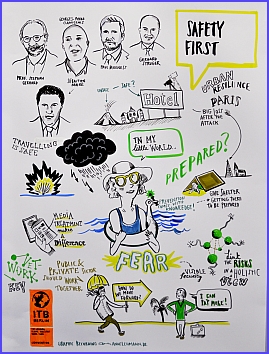 |
|
| Live graphic recording by Anne Lehmann during the ITB hotel talk – and her impression about safety and security. / all photos: HI |
Berlin (March 31, 2017). As strange as it may appear after the recent terrorist attack in London, many experts, including the highly regarded professor, Hans Rosling (who recently passed away), keep on saying that statistically, the world has never been safer than today. Yet, the risk is real - in Europe and everywhere else on the planet. Should one stop travelling because of it? "No" answered a strong panel of experts during the "ITB Hospitality Day" conference about safety & security. Moderated by Professor Stephan Gerhard, CEO of Solutions Holding, the discussion covered many topics such as: resilience, how hotels can be better prepared, who should pay for more safety and how sharing best practices within the industry could make the difference. All four panelists also agreed on one thing: talking about security & safety should not be taboo anymore.
Security & safety when traveling has become a trend topic. How cities, hotel groups and other businesses are preparing to face terrorist attacks, pollution, natural disasters, or internet hacking, these are questions any tourist could ask today, expecting a clear answer. Are hoteliers able to respond and reassure them in the hospitality industry for instance? Some are trying hard to do so, others are doing the bare minimum. But is that enough today?
Not really, according to the four experts present on stage that day. Starting with Sébastien Maire, Chief Resilience Officer City of Paris (an entity financed by the Rockefeller Foundation) who believes hoteliers can't do much on their own. "They won't be successful if isolated, fighting one fire at a time. Our approach is more global. We work in order to prepare the whole city, including the population, NGOs, municipalities, private businesses like hotels, etc. to be able to face shocks (terrorism, heat wave, flood, pandemic) and chronic stress (climate change, pollution, lack of social cohesion) in a more integrated and holistic way." Joining him on the importance of team work and networking, Paul Moxness, Vice President Corporate Safety & Security of Carlson Rezidor Worldwide confirmed: "As a hotel, or any player in the sector, you have to play your part, in the industry and in the local community too."
Train for catastrophes
Living in Istanbul for many years now, Gerhard Struger, Regional Vice President Turkey & Eastern Europe for FRHI (today AccorHotels) knows all about working closely with locals and fellow hoteliers. And for a good reason. He operated a property in Istanbul back in 1999 when the strongest earthquake in the history of Turkey shook the country and destroyed lives and buildings. "Our hotel was built according to Japanese construction standards and resisted very well to the quake. People found refuge in our hotel by the hundreds and we were not prepared for it. At that time, our security department was more focused on terrorism as the pro-independence group, the PKK was very active. Working jointly with partners that year, we started building up a protection plan, training people for catastrophes in a wider sense."
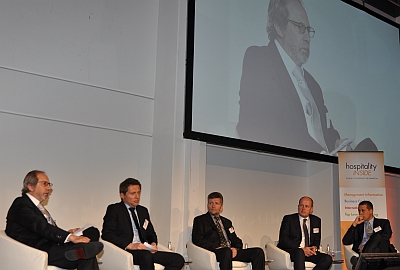 |
|
|
Moderator Professor Stephan Gerhard and the experts Sébastien |
Global Product Manager Safety & Security at Carlson Wagonlit Travel, Georges-Pierre Cladogenis confirms that having collaboration in both private and public sectors is crucial to provide the right information to the public. "Lots of information is available to private companies, less to tourists. It's crucial for any traveler to have access to truly vetted information while abroad and facing terrorism, medical urgencies (whose rate is higher than terrorism) or a simple travel disruption which can also create a safety risk."
Change in company's attitude
There has been a wide range of reactions to the past few years' tragic events. In the business travel sector, people had a sort of wake up call. Travel management companies are now asked to do more to reassure their customers. "The subject is on the table as companies consider their traveling employees as primary assets who need to be protected," explained Georges-Pierre Cladogenis. "Corporate social responsibility practices imply that a company provides its employees with safety and security. Business travelers expect that. For many companies, people's fear translated from "do we really need to do something now regarding safety and security and how much will it cost" to "how to move forward and integrate the best practices into our business despite the costs."
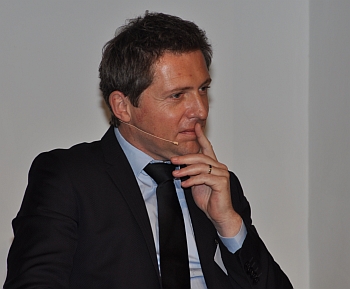 |
|
| Sébastien Maire: In a crisis, hoteliers can't do much on their own. |
More security and safety comes at a cost. So, who is going to pay? "It really depends on contracts I guess," answered Gerard Struger. A management company doesn't own any assets or shares in the property so it's not its responsibility. I believe it's the asset owner who has to pay. If it's a lease, it's the person who owns the lease. No matter who does, it's in everybody's interest to be prepared and in our case in Turkey, for instance, where we operate 8 hotels, every new property has been built with security and safety in mind." Paul Moxness confirmed: "It's true that we step in at an earlier stage today, often during the construction already". All agreed on the fact that people are prepared to pay more for their safety, guests included.
Remove the taboo
What can hoteliers do to improve safety and security? "First, the industry needs to remove the taboo around the topic," said Paul Moxness. "We have to acknowledge the risks and say okay, this is not what we really do but it is integrated in our business now, as every person is concerned with a safety and security aspect in the hotel." The VP pointed out that the way incidents were managed in the past can't work today. "Back then, one could keep an incident secret but today, whatever happens is livestreamed and all over Twitter in a minute. That's why our focus needs to shift way more towards prevention, but we have to be open about it. Bad things can happen but the more you talk and share, the more you are prepared," he said.
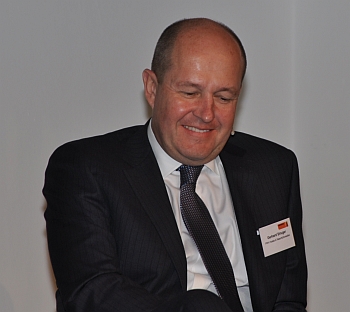 |
|
| Gerhard Struger: Protection against terror already starts with the hotel construction. |
The subject of security when traveling is quite complex, but many things can be done to mitigate that added Georges-Pierre Cladogenis. "Starting with prevention which comes with knowledge. Travelers need to be prepared. Companies like ours help businesses and their employees get the right information they need when they need it. The problem with hoteliers is that unlike airlines they don't have standard agreements. In the hospitality industry, it's more each brand, each country, each city to itself. Things are changing, however, slowly but surely."
After the International Hotel & Restaurant Association (which first brought hotels together to talk about security and safety in 2004) dropped the council, certain groups joined the Overseas Security Advisory Council (OSAC), which is facilitated by the US State Department and helps American businesses operate safely abroad. Most of the top ten hotel chains work closely together today to share best practices. "If an incident like Paris happens, it impacts not one but all the brands. We need to work closer as it's not about us making the safest hotel, but more about us working together to make travel safe for everyone," summed-up Paul Moxness.
Visitors decline impacts all
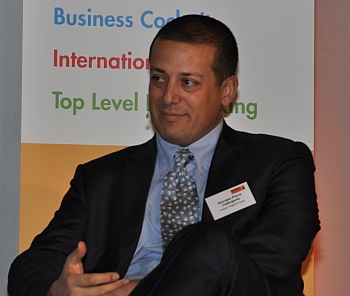 |
|
| Georges-Pierre Cladogenis: Today the traveller is the asset. |
If it's too early to put a number on the impact of London's recent attack, Sébastien Maire shared a few numbers about Paris after the terror. "Psychologically speaking, people were shocked. The treatment of the international media drove people away from Paris, especially Americans and Asians, resulting in the destination losing 2 million visitors. Consequences were huge, we are talking about a loss of billions of euros. It's a lot knowing that alone in Paris, tourism counts for 13% of employment." The resilience officer advocates for joints efforts and investments. "Losing visitors means less money for hotels and fewer taxesfor the city. It's in both our interests to work together," he said.
Sharing best practices leads to improvement; using technology could too. "There is no way for users to consider where it is safe and where it is not. Something can be done from a technology perspective and that's where the need is for our customers," explained Georges-Pierre Cladogenis whose company is currently working closely with partners to provide safety information about any given destination to business travelers, via a mobile app or any other means.
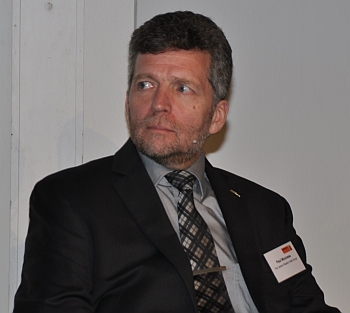 |
|
| Paul Moxness: Talk to people, share information with them – the better all are prepared. |
Travel safer today
"I have lived in Istanbul for many years now and I haven't changed my lifestyle since the attacks last December because at the end of the day, it can happen anywhere. It's not unsafe to travel to Istanbul or Turkey, you just have to use your common sense," underlined Gerhard Struger who mentioned that many hoteliers in Turkey are well prepared against terror and natural disasters. According to him, after an attack, it takes 24 months before people "forget" about it. The problem is that it keeps on happening again and everywhere.
"Travel is probably getting safer," confirmed Paul Moxness pointing out that in the past, bad things happened, but social media didn't exist. For Sébastien Maire too, travel is safer now than 10 or 20 years ago. "People do not act rationally after a terrorist attack. What we need to develop are measures to make security visible because people ask for it whether it is video surveillance in the city or national guards in the streets. It's reassuring to them. That being said, compared to terrorist attacks, pollution kills thousands each year in the Paris region, yet people perceive it as an acceptable risk. It’s all about perception." Paul Moxness signs his emails regularly with "Stay safe, always care." / Sarah Douag
Watch the video of this panel in full length!
Continuative Links:
- March 24, 2017 Guests going crazy ITB Hospitality Day Talk about the new impact of Internet of Things and AI
- March 24, 2017 Lending the soul from the full blooded restaurateur ITB Hospitality Day Talk on successful food concepts for hotel chains
- March 17, 2017 Tasty, colorful, social, central - ITB Hospitality Day Talk 2017: Hostel experts about the new colorful feeling
To print this article you have to be registered and logged in for newsletter, visitor or subscription.





